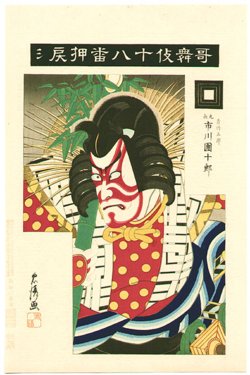
Kabuki Juhachiban
Encyclopedia

Kabuki
is classical Japanese dance-drama. Kabuki theatre is known for the stylization of its drama and for the elaborate make-up worn by some of its performers.The individual kanji characters, from left to right, mean sing , dance , and skill...
plays, strongly associated with the Ichikawa Danjūrō
Ichikawa Danjuro
is a stage name taken on by a series of Kabuki actors of the Ichikawa family. Most of these were blood relatives, though some were adopted into the family. It is a famous and important name, and receiving it is an honor...
line of actors ever since their premieres. These works were chosen and assembled as "the eighteen" by actor Ichikawa Danjūrō VII (1800-1832). The pieces were considered to be seminal representations of the aragoto
Aragoto
, or rough style, is a style of kabuki acting that uses exaggerated, dynamic kata and speech. Often, aragoto actors wear bold red or blue makeup , and have costumes that are padded and enlarged...
style in the repertoire. The Danjūrō line has continued to dominate the leading roles, and the printing and production of these plays ever since.
Shibaraku, Narukami, Sukeroku, Ya-no-Ne, and Kanjinchō are still considered among the greatest of all kabuki plays, and are performed at least once a year. These plays are also often performed for shūmei
Shumei
Shūmei are grand naming ceremonies held in Kabuki theatre. Most often, a number of actors will participate in a single ceremony, taking on new stage-names....
, auspicious naming ceremonies in which actors who receive new names, particularly those receiving the illustrious name "Ichikawa Danjūrō", perform in these great plays which are strongly associated with that lineage.
While the plays contained within the Kabuki Jūhachiban do number 18, the number, along with other eight-related numbers such as 80 and 88, is symbolic of the general concept of "a great many."
A Shin-Kabuki Jūhachiban (New Eighteen Best Kabuki Plays) was assembled by Ichikawa Danjūrō IX
Ichikawa Danjuro IX
Ichikawa Danjūrō IX was one of the most successful and famous Kabuki actors of the Meiji period ....
in the Meiji period
Meiji period
The , also known as the Meiji era, is a Japanese era which extended from September 1868 through July 1912. This period represents the first half of the Empire of Japan.- Meiji Restoration and the emperor :...
, representing his favorites, many of which are particularly representative of Meiji period kabuki.
Of the original eighteen, only ten or eleven are considered to still be actively performed, though some are performed far less frequently than others.
The Eighteen
- Fuwa* (1680)
- Narukami (1684)
- ShibarakuShibarakuShibaraku is among the most popular pieces in the Kabuki repertoire, and one of the celebrated Kabuki Jūhachiban . The flamboyantly dramatic costume and makeup used in this scene is famous and widely associated by the average Westerner with Kabuki in general...
(1697) - Fudō (1697)
- UwanariUwanariwas a kabuki play of the Kabuki Jūhachiban, first performed in 1699. It is no longer extant....
* (1699) - Zōhiki (1701)
- KanjinchōKanjinchoKanjinchō is a Japanese kabuki play by Namiki Gohei III, based on the Noh play Ataka. It is one of the most popular plays in the modern kabuki repertory....
(1702) - Sukeroku (1713)
- Uirō Uri (1718)
- Oshimodoshi* (1727)
- Ya-no-Ne (1729)
- Kagekiyo (1732)
- Kan'u (1737)
- Nanatsumen* (1740)
- Kenuki (1742)
- Gedatsu* (1760)
- Jayanagi* (1763)
- Kamahige (1769)
- __________
- * These plays are generally considered to be no longer performed (to have fallen out of the repertoire); however, revivals have been done, and continue to be done, while on the other hand some of those plays considered to still be in the repertoire may be performed only very infrequently.

